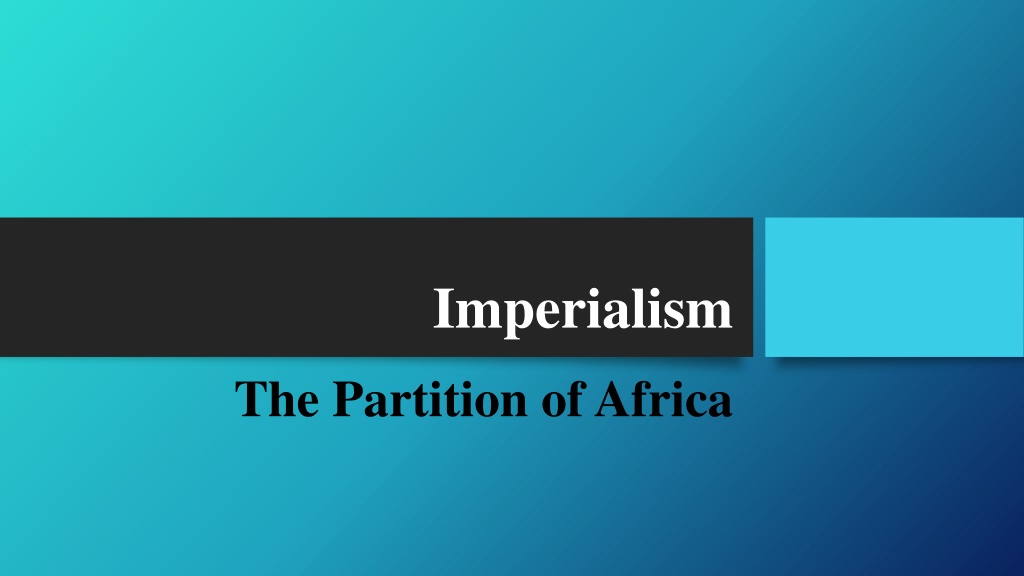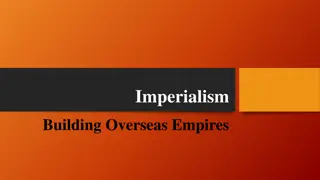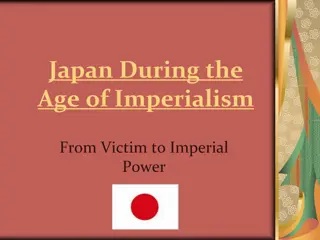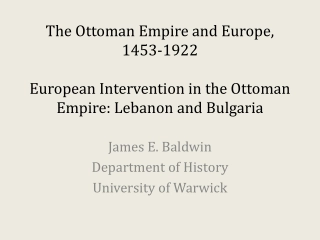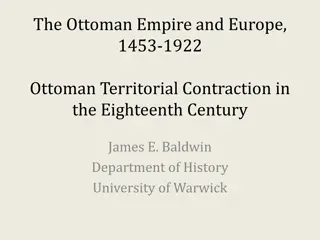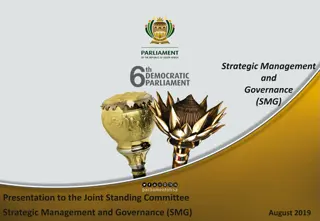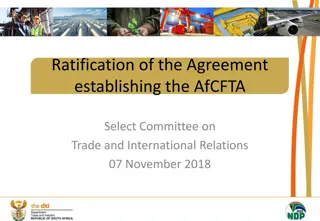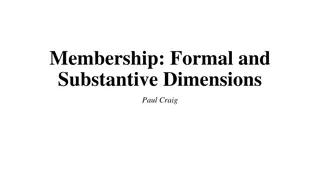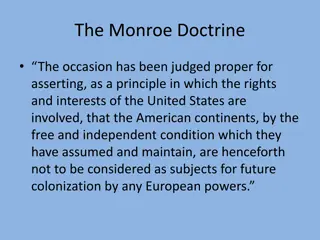European Imperialism and the Division of Africa in the 19th Century
European countries like Britain, France, and Germany began claiming African territories in the late 1800s, impacting indigenous populations and leading to various resistance movements. The Berlin Conference resulted in superimposed boundaries, affecting trade and resources. Islamic influences expanded in West Africa, while the Zulus in South Africa faced challenges from the Boers. Despite Zulu resistance, European advancements led to continued conflicts and the persistence of the slave trade.
Download Presentation

Please find below an Image/Link to download the presentation.
The content on the website is provided AS IS for your information and personal use only. It may not be sold, licensed, or shared on other websites without obtaining consent from the author. Download presentation by click this link. If you encounter any issues during the download, it is possible that the publisher has removed the file from their server.
E N D
Presentation Transcript
Imperialism The Partition of Africa
World History Standards W. 20 Describe the natural resources and geographic features of Africa, their role in attracting European economic interests, and their impact on global trade. W. 21 Analyze the outcomes of the Berlin Conference and the impact of superimposed boundaries on African indigenous populations, and compare the geographic progression of imperialistic claims on the African continent by European empires. W. 22 Describe successful (e.g., Ethiopia) and unsuccessful (e.g., Zulu Wars and Ashanti Wars) examples of African resistance to European imperialism.
Africa in the Early 1800s In the late 1800s, Britain, France, Germany, and other European nations began claiming African territories Across Africa, people spoke hundreds of languages and developed varied governments ranging from large states to small village communities
Africa in the Early 1800s Before 1800, much of North Africa fell under part of the Muslim world, remaining under the declining Ottoman Empire By the early 1800s, an Islamic revival spread across West Africa, beginning among the Fulani people in Nigeria The scholar and preacher Usman dan Fodio called for social and religious reforms based on sharia law
Africa in the Early 1800s Usman and his successors set up a powerful Islamic state in northern Nigeria Their success inspired other Muslim reform movements in West Africa, and more than a dozen Islamic rulers rose to power Islamic states had long influenced eastern Africa where a profitable trade had arisen in the slave trade
Africa in the Early 1800s In South Africa, the Zulus emerged as a major force under the leadership of Shaka Though Shaka waged relentless wars and conquered many nearby peoples, he set off mass migrations and wars By the 1830s, the Zulus faced the threat of the Boers, descendants of Dutch farmers forced from the Cape Colony by the British
Africa in the Early 1800s Although the Zulus held their own at first, their spears could not defeat Boer guns, and the struggle for Zulu land would continue until the end of the century Though European nations began outlawing the slave trade, it continued to Asia In 1787, the British organized Sierra Leone as a colony for former slaves, and later freed slaves from the US established Liberia
Europeans Advance into Africa In the 1800s, medical advances and the river steamship changed the course of African history European explorers began pushing into the interior of Africa to map its great rivers, enduring great hardships
Europeans Advance into Africa Catholic and Protestant missionaries followed the explorers into the African interior Missionaries built schools, medical clinics, and churches in their desire to help the Africans Missionaries still took on a paternalistic view of Africans, seeing them as children in need of guidance
A Scramble for Colonies King Leopold II of Belgium hired Henry Stanley to explore the Congo River basin and arrange trade treaties with African leaders in 1879 Leopold dreamed of conquest and profit, and his activities set off a scramble by other nations to colonize Africa In 1884, European powers met in Berlin to attempt to peacefully establish rules for the colonization of Africa
A Scramble for Colonies At the Berlin Conference, European powers recognized Leopold s claims to the Congo, but called for free trade on the Congo and Niger rivers They agreed a European power could not claim any part of Africa unless it set up a government office there In the 20 years after the Berlin Conference, the European powers partitioned almost the entire continent, redrawing the map with little regard for traditional settlements or ethnic boundaries
Horrors in the Congo Leopold and other wealthy Belgians exploited the riches of the Congo: copper, rubber, and ivory Laborers were savagely beaten or mutilated by their Belgian overseers International outrage eventually led to Leopold turning over his personal colony to the Belgian government and it became the Belgian Congo in 1908
The French in Africa France began colonizing Africa in the 1830s, conquering Algeria at the cost of tens of thousands of French lives and many more Algerians France then extended its influence along the Mediterranean into Tunisia and into West and Central Africa At its height, France controlled an empire in Africa as large as the continental US
The British in Africa British claims in Africa were more scattered, but included more heavily populated regions with rich resources The British took chunks of West and East Africa, took control of Egypt, and pushed into the Sudan
The British in Africa In South Africa, the British forced out the Boers when the British purchased the colony from the Dutch in 1814 Though the Boers tried to establish their own republics further north, when gold and diamonds were discovered, this brought conflict again The Boer War (1899-1902) involved bitter guerrilla fighting, and though the British won, victory came at a great cost
Resisting Imperialism Across the continent, Africans resisted European imperialism The French met resistance to imperialism in Algeria and across West Africa where Samori Toure was attempting to build his own empire The British fought the Zulus in southern Africa and the Asante in West Africa
Resisting Imperialism The Germans fought wars against the Yao and Herero in East Africa The Germans fought an especially fierce war against the Maji-Maji in 1905 The Germans finally won after burning thousands of acres of farmland, leaving thousands to starve to death
Ethiopia Stands Ethiopia managed to resist European colonization and maintain independence In the late 1800s, Menelik II began modernizing his country, hiring European experts to plan roads and bridges and set up a school system
Ethiopia Stands Menelik II imported weapons and European officers to train his army In 1896 when Italy invaded Ethiopia, Menelik was prepared and defeated the Italians at the battle of Adowa Ethiopia was the only African nation aside from Liberia to preserve its independence from European colonialism
